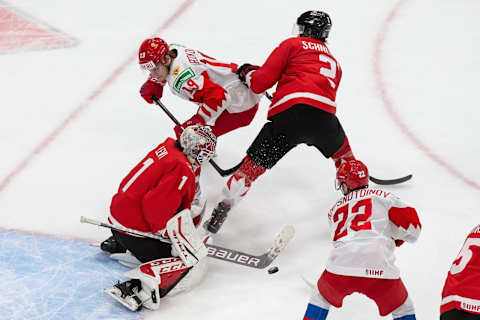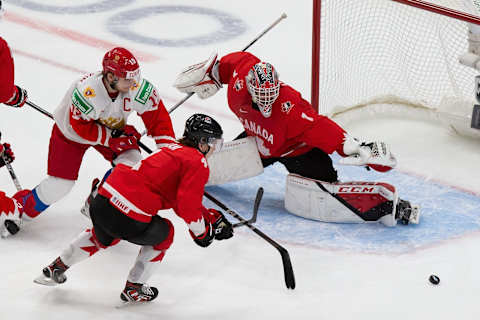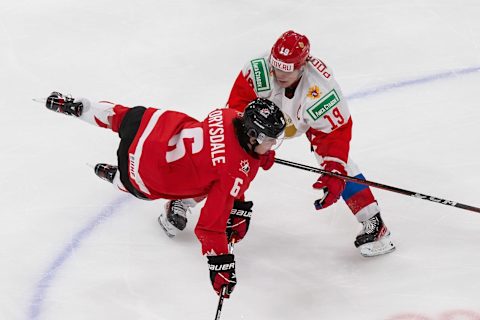Canucks: Breaking down Vasili Podkolzin’s WJC game versus Canada


Vancouver Canucks prospect Vasili Podkolzin and his Russian counterparts faced off against Canada in a lopsided World Junior Championships semi-final matchup.
Vancouver Canucks prospect Vasili Podkolzin had an electric performance against an elite Canadian squad in the World Junior semi-finals.
Unfortunately, the Russians fell by a score of 5-0, as the Canadians’ star power outmatched them as a whole.
As per usual, Podkolzin’s powerful, intelligent play style was on full display throughout the game. Podkolzin made several eye-catching plays despite the more robust and skilled opposition relative to the rest of the Russian roster.
So, in this article, we will fully break down Podkolzin’s game to give Canucks fans some further insight into Vancouver’s top prospect, despite the crushing loss.
First period: Canada’s hot start
Podkolzin started the game alongside Marat Khusnutdinov and Rodion Amirov, facing off against Canada’s top line of Dylan Cozens, Connor McMichael and Jakob Pelletier. He chipped the puck back to the Russian defence off the opening faceoff to begin the game.
His first shift was pretty quiet. He made a few of his textbook plays along the boards, leading to unsuccessful dump-ins for the Russians. He finished the shift by laying the body on alternate Canadian captain Bowen Byram, forcing a dump and ultimately the recovery of possession for Russia.
After Podkolzin left the ice, the Canadians went to work, quickly jumping to a 1-0 lead early from a nifty Alex Newhook shot.
Podkolzin began his second shift with an errant pass out of Russia’s zone, leading to an icing call, without much to report after that.
Podkolzin’s third shift was his most noticeable thus far. He transitioned the puck into Canada’s zone, laying it off to Semyon Chistyakov for a shot on goal. He then took a stab himself near the goal line which caught goaltender Devon Levi off guard, but the shot was ultimately deflected.
The game was physical from the get-go, with every player finishing their checks and making the extra effort at times, yet Podkolzin still looked confident.
Canada pounced on Russia’s every mistake, and the skill disparity was on display whenever Russia’s top line wasn’t on the ice. Honestly, Podkolzin was the only Russian skater to match Canada’s intensity.
Midway through the period, the Canadians scored their second goal of the game, which Podkolzin was on the ice for. He was a little overzealous in his defensive play, scrambling to finish his checks, and caught himself in no man’s land in an attempt to stop the goal.
At the 12:50 mark, Podkolzin took a four-minute high-sticking penalty on a Byram dump-in. This left the Russians a man down and without one of their best players for most of the time remaining in the first.
In the second half of the penalty, the Canadians capitalized, as Cole Perfetti shot rifled a shot from the right circle, giving them a gutwrenching 3-0 lead.
In Podkolzin’s first shift after the penalty, he got into a puck battle at Canada’s blue line, which ended in a thunderous check on Kaiden Guhle.
https://twitter.com/ChrisFaber39/status/1346244555595661313?s=20
This hit seemed to invigorate Podkolzin, as he headed straight for the net subsequently after, and got in a scuffle with Guhle after the whistle.
In the closing minutes of the first, Podkolzin had his second offensive look of the game, taking the puck at the neutral zone and streamlining his way to the net, only to be thwarted by Jamie Drysdale, who extinguished Podkolzin’s attempt with a slick stick check.
The period ended with a resounding 3-0 Canada lead. Shots also tipped in Canada’s favour, finishing 16-7.
Podkolzin’s board play wasn’t as dominant in the first, but that’s to be expected when facing the tournament’s out-and-out favourites.
This certainly wasn’t one of Podkolzin’s best periods of the tournament by any means, but then again, nobody on Russia played well.

Second period: Podkolzin causes trouble for Canada’s defence
Podkolzin opened the period tearing through the neutral zone, powering through Drysdale and down the left-wing before firing a wide shot from the near boards past the Canadian net.
It was a complete solo effort and yet another illustration of Podkolzin’s physical capabilities.
Podkolzin looked particularly jumpy to start the period, as he pounced on every puck that entered his vicinity.
Podkolzin’s second shift saw the Russians hemmed into their own zone until Podkolzin orchestrated an exit, leading to a dangerous shot on net, and another sizzling attempt from the point.
Podkolzin’s play thus far showed exactly why facilitating play through Podkolzin was crucial for the Russians, as most players were sloppy on loose pucks and the forecheck.
The Russians’ mediocre play led to another brutal goal off a Braden Schneider point shot on Yaroslav Askarov’s glove side, which fell victim to several of Canada’s goals.
Around the six-minute mark of the period, Podkolzin made another drive into Canada’s zone. He skated through the neutral zone, speeding past Byram as he dumped the puck into the right corner. After moving in to retrieve the puck, he met Drysdale for another confrontation, which Podkolzin won.
Podkolzin’s retrieval led to a pass in front which leaked through to the point, which still awarded the Russians a shot on goal.
His battles with Drysdale were particularly interesting to see, as while other Russian players attempted to drive by the 2020 top-pick, Drysdale won possession with ease.
Drysdale is a positionally sound defender and uses his frame effectively to guard forwards from attacking the net. As Podkolzin consistently overpowered Drysdale, it was indeed another display that the Russian ranks among some of the best young hockey players.
At this point, it still looked like Podkolzin was the only player making an effort for the Russians. He became evidently more vocal, as most of Russia’s successful exits moved through him.
Quite frankly, when their top line wasn’t on the ice, Russia looked utterly unorganized. Players were getting in the way of each other, and there was no structure to their breakout. Canada completely outmatched them.
Near the eight-minute mark of the period, Podkolzin was featured on the penalty kill. He did well to separate the puck from his opponents, as he snuffed out Canada’s first attempt on the man-advantage.
Around the 13-minute mark, Podkolzin spent another shift in his own zone. He put pressure on Byram to dump in the puck deep. However, an unorganized Russian defence led to a dangerous McMichael shot in close.
Podkolzin obstructed a Philip Tomasino shot attempt in his next shift, making an excellent stick check as the Russians failed to divert Canadian pressure in the defensive zone.
Near the end of this shift, Podkolzin collided with Byram’s stick knob or glove along the boards, knocking him on to the ice.
While the game had not gone Russia’s way thus far, Podkolzin was a thorn in the side for the Canadian defence.
Podkolzin mixed it up with defensive stalwarts Byram, Drysdale, and Guhle numerous times at this point.
Again, it’s promising for Canucks fans to see Podkolzin contend with Canada’s top guns on the back end.
At 16:34, Russia received their first attempt on the man-advantage, after McMichael took a tripping call.
The first Russian unit had Canada scrambling, leading to a Mikhail Abramov goal after several shot attempts. Unfortunately, the goal was called back after a successful offside challenge from Canada.
After the goal was reversed, Podkolzin took the ice with Russia’s second unit outside of Canada’s zone. During a break in the game, Podkolzin assumed his leadership duties, trying to spark a fire in his teammates to end the period.
Podkolzin again moved the puck himself past Canada’s blueline. After entering the zone, he retrieved possession in the corner and moved the puck to the point.
He then resumed his post at the net-front on the powerplay, taking a Russian shot to the body, which ultimately led to a dangerous situation upfront.
At the end of the shift, Podkolzin took the butt end of Dawson Mercer’s stick to the throat, which obviously caused him some pain, but he looked to be okay by the end of the frame.
Just as Russia began to build some momentum, the game flipped back in Canada’s favour. The referees awarded Cozens a penalty shot.
While he hadn’t played great up to this point, Askarov made a few impressive stops, with the penalty shot being one of them. Askarov made a beautiful toe save on Cozens’ backhand attempt.
The Russians did end the period looking better than they did throughout most of the game, possibly due to what looked like an emphatic speech from their captain.
Captain Podkolzin pic.twitter.com/QmPYuv1RSh
— Gillian Kemmerer (@gilliankemmerer) January 5, 2021
The running shot total finished at 25-19 for Canada, giving Russia the slight edge in the second, thanks to their flurry of offence to end the period.
With 40-minutes of the game completed, the match was all but won for Canada. They diffused every attempt the Russians had made, which there weren’t many of.
It became more apparent that the Russian team lives and dies by Podkolzin. He looked to be the only player that could successfully break through the Canadian defence, or even complete a pass at times for that matter.

Third period: Podkolzin tries to take over
Podkolzin started the third period for the Russians, just as the previous two. He didn’t see too much action from the jump, apart from some transitional play that proved meaningless.
The other Russians came out fierce in the final frame, as the rest of the team began to match Podkolzin’s intensity. They were far chippier and seemed to be more urgent in their forechecking.
Podkolzin’s second shift in the third came earlier than previous periods, which was a sign that head coach Igor Larionov would lean on his top player heavily to close out the game, which should come as no surprise.
Before the four-minute mark, Podkolzin made another patented entry into the zone, attempting a pass to an unsuspecting teammate.
This has been another reoccurring theme for the Russians; Podkolzin attempts to create offence, but cannot complete the play with his teammates who are either unable to connect on the pass, or not in a ready-position to collect the feed.
Despite a slightly improved effort from the Russians, the Canadians kept on pressing. Every time Canada controlled the puck, they threw dangerous pucks toward Askarov, with the Russians unable to provide an answer.
Near the seven-minute mark, Podkolzin made another awe-inspiring solo effort. He skated the puck from his own zone, down the left side, evading multiple defenders. He wheeled around the net and into the slot, wiring a puck onto goaltender Levi.
As Canadian defenseman Drysdale subsequently attempted to exit the zone, Podkolzin made another emphatic check at the neutral zone to disrupt Drysdale’s departure.
Near the halfway point of the period, Podkolzin’s physical play was on display again, getting into various puck skirmishes with Tomasino’s line. Podkolzin’s puck recovery lead to one offensive opportunity for the Russians.
At the 11:30 mark, Podkolzin’s shift consisted of several failed exits from both sides and mini puck battles.
As time began to dwindle, there was no change in strategy from the Russians. They continued rolling their lines, which, as expected, yielded very few dangerous chances.
Near the 14-minute mark, Podkolzin’s line caught themselves in another cycle of possession changes with the Canadians, consisting of multiple neutral zone clashes.
Tensions began to boil over as the period progressed, with the Russians beginning to lose their cool. Both teams took an unnecessary roughing penalty, leading to some four-on-four minutes for Podkolzin.
With the open space, he engaged in another one-on-one encounter with Drysdale on the wing.
Podkolzin was a spitfire on this shift. After his shot deflected wide, he got into another forechecking battle behind the net.
After picking the puck off of Byram, Podkolzin did his best to muscle off Canada’s Mercer, after ultimately losing possession of the puck.
Following a Russia ntimeout, Podkolzin was back on the ice to complete the four-on-four, as his team emptied their net.
With the clock running down, play began to run through Podkolzin more, as he found himself at the half-wall rather than at the net front.
Podkolzin got himself in the mix with time expiring, picking off pucks in the corners and cycling possession into open space, but his efforts were to no avail.
After Podkolzin’s final shift in the game concluded, the Canadians converted on the empty net, with Cozens adding to his tournament-leading goal and point totals.
The game ended with a final score of 5-0, with a shot count of 35-28 in favour of Canada.
Podkolzin’s third period was his best of the game, as he genuinely attempted to pull Russia back into the game all by himself. However, if there’s one team where you’re least likely to do so against, it’s Canada.
Podkolzin’s final stat line included a -1 with one shot on goal while leading Russian forwards with 18:03 TOI.
As expected, Podkolzin was selected as Russia’s player of the game.
The loss was genuinely overwhelming for Podkolzin, as he fought tears when he won the award.
Podkolzin was also chosen as one of Russia’s top-three players of the tournament. If you couldn’t tell already, he was a cut above the rest of his teammates.
Podkolzin’s sense of urgency throughout the contest is quite telling, as he kept his foot on the gas until the final whistle.
The Canucks prospect gave it his all throughout this entire tournament, and was Russia’s undisputed leader, as a captain should be. He advertised a calm demeanour and led by example in each of Russia’s games.
The next step for Podkolzin is a bronze medal bout against Finland, where the Russian captain will try to take home some hardware for his country.
Of course, you can’t read too much into one’s World Juniors performance, as the tournament’s relevance to a player’s career path is often meaningless.
However, what can be said about Podkolzin is that he presented elite hockey IQ, brute strength, and impressive intangible skills on one of hockey’s most prominent stages. He also showed a relentless drive while being a calming and respected leader.
Canucks Prospect Report: Costmar impresses, Podkolzin on to WJC semi’s. dark. Next
So, if there’s one thing Canucks fans can take from Podkolzin’s performance, it’s that the kid has heart. Knowing this, there’s no doubt he will fit right in as a Canuck.